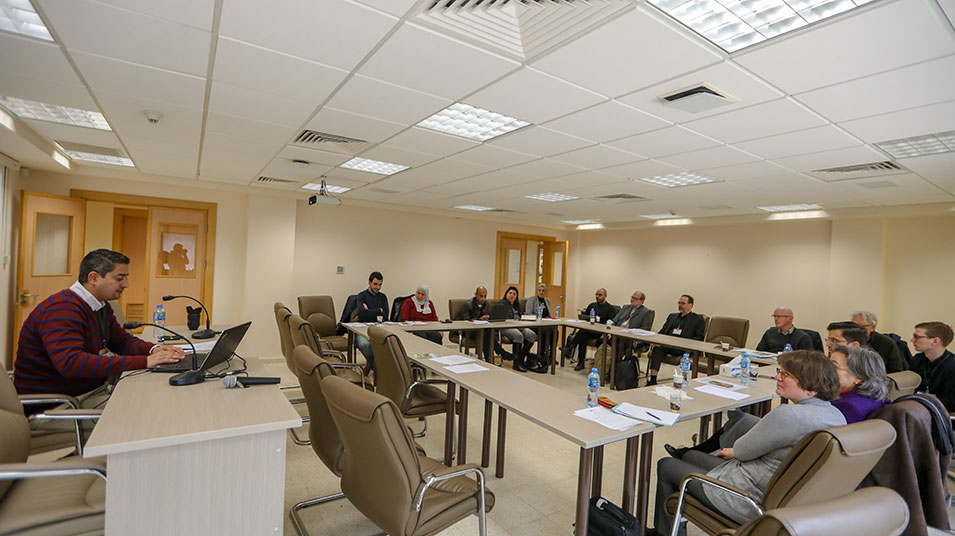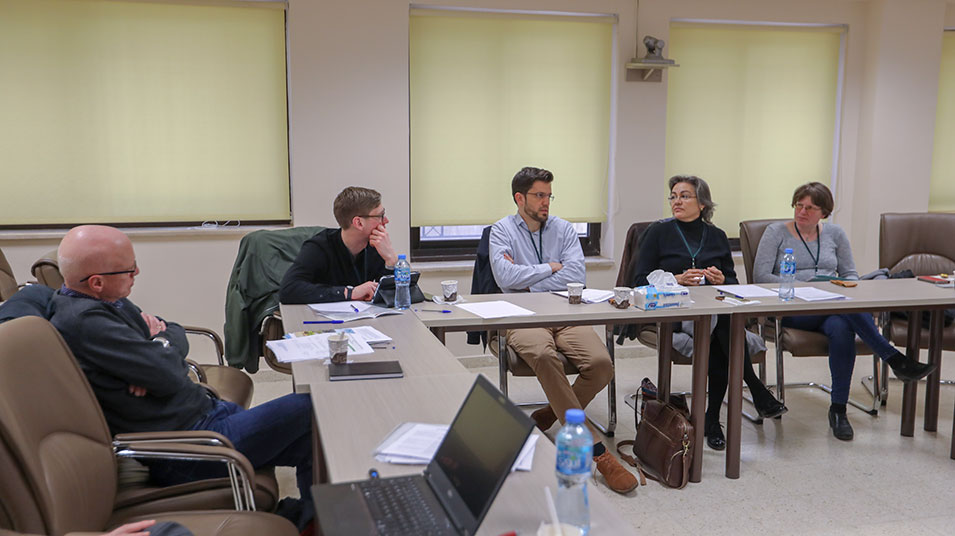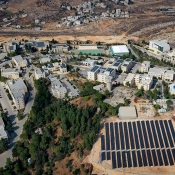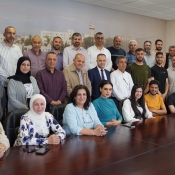Birzeit University bolsters international connections, student and faculty exchange in International Staff Week
Birzeit University concluded the first International Staff Week on March 28, 2019. The event hosted academics and representatives of universities from around the world in a series of events that included workshops and discussions of opportunities for cooperation such as joint research, exchange programs for faculty, staff and students, as well as training programs.
The five-day week, held from March 25 to 29, 2019, was organized by the External Academic Relations Office to bolster connections between Birzeit University and international institutions of higher education.
Participating universities included Middlesex University, UK; Università Telematica Pegaso (Pegaso Telematic University), Italy; the University of Bergen, Norway; the University of Eastern Finland, Finland; the University of Gothenburg, Sweden; and Philipps-Universität Marburg (Philips University Marburg) and Friedrich-Alexander-Universität Erlangen-Nürnberg (University of Erlangen-Nuremberg), both in Germany.
Vice President for Academic Affairs Henry Jaqaman noted that the delegates and Birzeit University members were immersed in an interactive learning environment that enabled them to develop personal and professional skills and to network with colleagues from an international range of institutions. He outlined that themes included currently relevant topics such as student and staff mobility and intercultural competencies. “This week provides us with an opportunity to share our thoughts, experiences and best practice in intercultural competence, personal skills development and student mobility.”
Each day of the “International Staff Training Week” focused on a specific theme. The first day, titled “Expanding Cooperation,” included introductions and presentations about the history, academic programs and administrative units of Birzeit University and introductory presentations by the representatives of the visiting universities.
On the second day, held under the theme “Erasmus+ Mobility (International Credit Mobility-ICM),” mobility policies and procedures explained by Khalil, and issues related to credit transfer and study credit recognition were clarified by the university’s registrar and Director of Admissions, Bassem Sayrafi.
The third day discussed Erasmus+ Key Action 2-Capacity building in the field of higher education (CBHE), which aims to encourage cooperation between European Union universities and their partners to address the challenges that are facing the management and governance of their higher education institutions. Rana Haj Yassin, the grants and contracts officer, and Nadine Khoury, the projects management officer at the Office of the Vice President for Community Affairs, briefed the audience about Birzeit University’s experience in Erasmus+ Key Action 2, as relevant to the tasks of the Office of Grants and Contracts and the Project Management Unit.
Iyad Tumar, an assistant professor at the Department of Electrical and Computer Engineering at Birzeit University, gave an example on the university’s participation in Key Action 2 projects by sharing his experience in “Fostering Entrepreneurship in Science, Technology, Engineering and Math-FESTEM,” a project designed to enhance the outcome of formal education in the fields of science, technology, engineering and mathematics in order to meet the needs of the Palestinian labor market.
Coordinator of Relationship with Labor Market Suhair Morar and Atef Shkokani, the project’s coordinator at Birzeit University’s Innovation and Entrepreneurship Unit, presented a session on the role of the unit in fostering and facilitating entrepreneurial activities among students, faculty and staff who create and work on new ideas. The unit serves to help design and implement initiatives that bolster the university’s innovation environment.
The universities’ representatives also met with Director of the National Erasmus+ Office in Palestine Nedal Jayousi. He gave a brief overview of Erasmus Plus-supported projects in Palestine, focusing on “Capacity Building in the Field of Higher Education” and “International Credit Mobility.”
The delegation was introduced also to the university’s Palestine and Arab Studies Program (PAS), that focuses on teaching Arabic to non-native speakers, and to the Right to Education Campaign that aims to document and archive the Israeli occupation’s violations against the university’s students, faculty and staff members.
During International Staff Week, Ari Haaranen and Jussi Kauhanen from the University of Eastern Finland gave a series of lectures to the students of the Faculty of Pharmacy, Nursing and Health Professions. The two professors talked about qualitative research methods in health-related studies, discussed social inequalities of health, and gave a brief overview of the nursing and health systems in Finland. They also met with the faculty’s dean and a number of its professors to discuss prospects of cooperation.
Helge Bjørlo, from the University of Bergen, and Leslie Tramontini and Christina Bohle from Philipps-Universität Marburg held an information session that introduced international mobility programs and academic exchange opportunities at their universities. Feras Hammami, an assistant professor of critical heritage studies and urban planning in the Department of Conservation at the University of Gothenburg, Sweden, in coordination with Birzeit University’s doctoral program in the social sciences, led a seminar, titled “Reconstructing Spaces: Protest, Memory and Discourse,” that dealt with heritage, conflict, and peace-building .
Officer of External Academic Relations Amir Khalil concluded International Staff Week by assuring that it has provided great opportunities for networking and for the sharing of knowledge and best practices, both within and across professional areas, to the benefit of Birzeit University and of all partner institutions.









